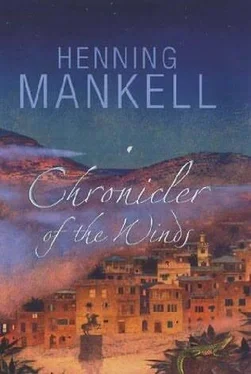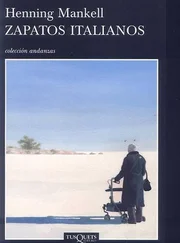'The President ought to make him his adviser. He's the smartest person in the whole country.'
Several days later one of the girls who sold bread pointed him out to me; I think it was the thin little girl called Dinoka, who was always swinging her hips so seductively whenever a man came by. She pointed at a group of street kids who had their headquarters right outside the theatre. The boy she identified as Nelio was the smallest of all. He might have been nine at the time.
'He's never been beaten up,' said Dinoka with awe. 'Just think, a street kid who's never been beaten up.'
The life of the street kids was hard. Once they ended up on the streets, there was most often no turning back. They lived in filth, sleeping in cardboard boxes and rusty cars, scavenging food wherever they could find it, drinking water from the cracked fountains that still remained from Dom Joaquim's day. When it rained they would kick mud on to the cars that were parked outside the banks and then innocently set about washing them down when the owners came out to drink their afternoon coffee at the Scala or the Continental. They stole when they had the chance, they carried sacks of flour for Dona Esmeralda in exchange for old bread, and they knew that life would never get any easier.
Each group of street kids had its own territory, and they organised their lives into small dictatorships in which the leader had unlimited power to judge and to mete our punishment. They often got into fights with each other, or with other groups that intruded on their territory, or with the police, who were always suspecting them of having stolen whatever couldn't be found. They chased the wild dogs. They caught rats in ingeniously designed traps, and then they doused them with petrol siphoned off from cars, and they cheered as the rats were incinerated.
They came from all sorts of places, and they all had their own stories. Some had lost their parents during the long war, others had no memory of ever having had parents. Many had fled from step-parents; others had been literally thrown out of the house when there was not enough room or food for them any more.
But they were always laughing. Sometimes when the heat of the bakery was too strong and the bread wasn't yet ready to be taken out of the ovens, I would stand outside and watch them. They were always laughing even when they were hungry, tired or sick. They laughed non-stop, especially at the fury of the drunken Leopoldo. Occasionally he would come tearing out into the street from his café if he thought they were making too much ruckus and throw beer cans at them, even though he knew that the next day the cans would be neatly lined up outside his café door and cause him all sorts of trouble as he was about to open.
The stories about Nelio were legion. About his slyness and cunning, about his ability to administer justice, and especially about how he managed to avoid being beaten up. I also heard rumours that he possessed magic powers, that he carried the spirit of a deceased curandeiro who in the beginning of time, when the city barely existed, had exercised his power over the people who lived near the wide estuary.
So I knew that he existed. I understood that he was remarkable.
But I had never talked to him. Not until that night when I was alone in the bakery and heard the loud shots from inside the theatre. I raced up the winding stairs and sneaked into the uppermost gallery. To my surprise, I saw that the spotlights were on, and there was a set onstage that I had never seen before.
And in the middle of the light lay Nelio. Blood was streaming from his body; it was almost black against his white, Indian cotton shirt. I stood there in the dark with my heart pounding and tried to think. Who had shot him? Why was he lying on the stage in the middle of the night, bathed in the spotlight and blood? I listened for any sound, but everything was quiet.
Then I heard him wheezing, lying there on the stage. I fumbled my way down the dark steps, in constant fear that someone would pop up out of the dark and aim a gun at me too. When I reached the stage at last and fell to my knees at his side, I thought he was already dead. But as if he had heard me, he opened his eyes. They were still clear, even though he had lost a great deal of blood.
'I'll go and get help,' I said.
He shook his head weakly. 'Carry me up to the roof,' he said. 'All I need is fresh air.'
I took off my white apron, shook off the flour dust and ripped it into strips. Then I wrapped them in a bandage around his chest where he had been shot; I lifted him and carried him up the narrow stairway to the roof. I kept a mattress there that I had found one morning next to the rubbish bins outside the bakery. That's where I set him down. I bent my face close to his mouth to see if he was still breathing. When I was sure that he was alive, I raced down to the ovens, got some water and a lamp, and went back up to the roof.
'I have to get help,' I repeated. 'You can't stay here.'
Again he shook his head. 'I want to stay here,' he said. 'I'm not going to die. Not yet.'
He sounded so determined that I couldn't make myself object, even though deep inside I knew what he needed most was a doctor.
He turned his head and looked at me. 'It feels so cool up here,' he said. 'This is where I want to stay.'
I sat down beside him. Now and then I gave him some water to moisten his lips. Since he had been shot in the chest, I didn't dare let him have anything to drink.
That was the first night.
I sat on the mattress at his side. When he seemed to be asleep, I would go down to the ovens to make sure the bread was not burning.
When it was still long before dawn, he opened his eyes again. By then he had stopped bleeding, and the bandage had grown stiff on his thin chest.
'The silence,' he said. 'Here I can dare to release my spirits.'
I didn't know what to say. The words sounded strange coming from a boy who was only ten years old.
What did he mean?
Much later I would understand.
That was all he said.
For the rest of the night, that first night, he was silent.
I have sometimes wondered why the sunrise arouses such melancholy in my soul. Often I would stand on the roof after a long night in the bakery where the heat was at times so intense that I felt it was about to drive me mad. In the early dawn, when the city was just starting to wake up, I would feel the coolness of the morning breeze from the Indian Ocean, watch the sun rise out of the sea like a huge globe, and feel a heavy sadness in my weary mind.
Could this melancholy be a greeting from the spirits, those who care even about a simple baker? A reminder of the mortality that also awaits me?
But on that morning, on that second day when Nelio had already been lying on the filthy mattress for many hours, I had no time to think about the spirits. I usually washed off the steam and sweat from the long night in the bakery at a water pump behind the theatre, where two carpenters would already be at work building the sets for Dona Esmeralda's productions. Then I would walk home through the city, which at that time of morning still smelled fresh, home to the place I shared with my brother Augustinho and his family in a bairro perched along one of the steepest slopes at the mouth of the river. But on that morning I did not leave. That wasn't entirely out of the ordinary, because sometimes I would lie down to sleep in the shade of the tree which years ago had taken root between the theatre and the Indian photographer's studio.
I was also the only one who ever went up to the roof. I had kept secret the existence of the almost invisible extension of the winding staircase and the rusty sheet-metal door. I'm not sure that even Dona Esmeralda knew it was there. I don't think she has ever set foot on the roof If there was one thing in life that didn't interest her, it was a view, no matter how spectacular it might be.
Читать дальше












